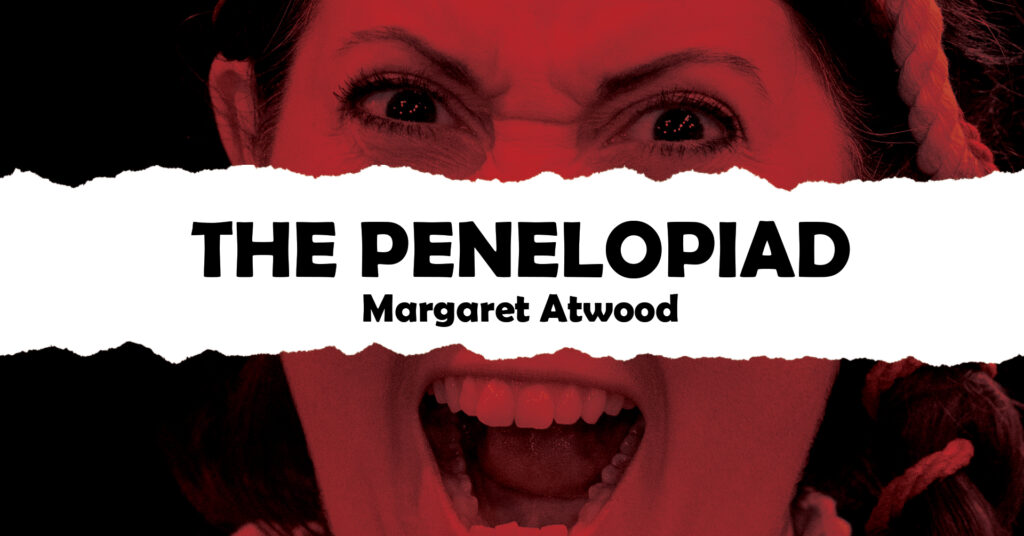
The Penelopiad
“Now that I am dead I know everything…”
By Margaret Atwood…………………………………….Directed by Rebecca Murphy
Penelope, dutiful wife of Odysseus and less beautiful cousin of Helen, is ready to tell her story.
Left alone for decades while Odysseus fights in the Trojan War, Penelope must face her own battles, managing Ithaca, difficult in-laws, her son, and hordes of increasingly menacing suitors.
Adapted for the stage by Margaret Atwood (The Handmaid’s Tale), The Penelopiad is a contemporary take on Homer’s The Odyssey that sees Penelope and her twelve wronged maids take centre stage. Full of live music, poetry, tragedy, and Atwood’s wicked humour The Penelopiad is sure to be a night of storytelling at its most epic!
SEASON DATES:
Aug 25th – Sept 10th
VENUE:
PIP Theatre | 20 Park rd, Milton Brisbane 4064
AGE/ GRADE RECOMMENDATION:
Gr. 10 – 12
RUNNING TIME:
approx. 120 mins
THEMES: Gender, Class, Power Dynamics, Violence, Self-Expression, War, Friendship, Storytelling vs Truth
CONTENT NOTES: This production includes stylised violence (physical and sexual) and mild coarse language. All moments of threat and violence have been choreographed as part of a professional, rigorous, and respectful rehearsal process.
Please consider the appropriateness of this production for your educational context and please contact us (education@qldshakespeare.org) should you have any questions.
CURRICULUM CONNECTIONS
DRAMA
The Penelopiad offers a contemporary, female-focused retelling of one of the greatest legends of all time. No longer just a footnote in the “hero’s” journey, the women of Ithica weave their own stories in Margaret Atwood’s play, based on her novella of the same name. Using many dramatic conventions including non-linear storytelling, narration and monologue, stylised movement, and live song and music, The Penelopiad challenges the audience to look beyond the surface of a story to uncover the depths of human experiences hidden below.
Styles & Form:
Contemporary Performance
Theatre of Social Comment
Ensemble Theatre
Dramatic Conventions:
Hybridity
Non-linear
Multiple Roles
Fragmentary Props & Costumes
Fluidity of Time & Place
Appropriation – Myths & Legends
Narration & Monologue
Stylised Movement
Use of Song & Live Music
ENGLISH & LITERATURE
Legends & Fables
Narrative Building
Comparison of texts around similar themes (see The Odyssey, The Illiad)
Adaptation (see Margaret Atwood’s novella of The Penelopiad)
Representation – language and identity
SENIOR CURRICULUM LINKS (QLD)
GENERAL DRAMA
UNIT 1: Explore drama as a means to tell stories and share understandings of the human experience. Explore a range of non-linear dramatic forms and hybridity of conventions and forms in storytelling.
UNIT 3: Explore how drama can be used to challenge our understanding of humanity over time, investigating dramatic styles that are united by social commentary, and that question their world and advocate change.
UNIT 4: Develop the knowledge, understanding and skills required to make and respond to dramatic works that reshape and challenge meaning and how stories can be enacted.
DRAMA IN PRACTICE APPLIED SYLLABUS
Core Topic One:
Purposes and contexts: dramatic, real and general contexts.
Production elements and technologies: note the applied theatre technologies, stage management, design, music, lighting, sound, etc.
Electives:
The electives provide the focus for the exploration, development and integration of the two core topics, and associated concepts and ideas. They cover broad topics and reflect the current work, community, study and leisure environments in which drama is used.
- Acting (Stage and Screen)
- Directing
- Technical Design and Production
- Theatre Through the Ages
GENERAL ENGLISH
UNIT 1: Individual and collective experiences and perspectives of the world.
UNIT 3: Explore connections between texts with representations of the same concepts and issues in different texts as they resonate, relate to, and clash with one another.
LITERATURE
UNIT 2: Explore ways literary texts connect with each other — genre, concepts and contexts; ways literary texts connect with each other — style and structure; creating analytical and imaginative texts.
UNIT 3: Students inquire into the power of language to represent ideas, events and people, comparing these across a range of texts, contexts, modes and forms.
GENERAL CAPABILITIES
Critical and Creative Thinking: “seeing or making new links that generate a positive outcome” or “generating open- and far-mindedness” or “inquisitiveness”
Ethical Understanding: Students learn to develop ethical understanding as they explore ethical issues and interactions with others, discuss ideas and learn to be accountable as members of a democratic community.
